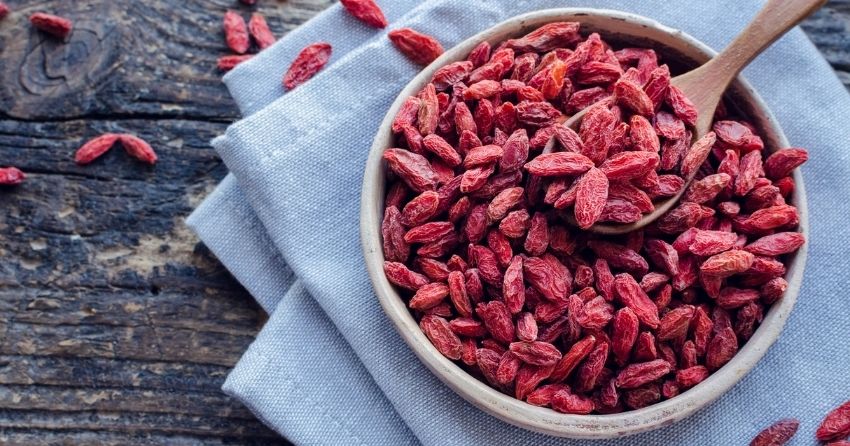Dried Goji Berries Can Protect Against Age-Related Vision Loss

The goji berry, also called the wolfberry, has taken the United States by storm, being dubbed a “superfood” and finding its way atop health smoothies and bowls in a dried form akin to raisins. The orange-red berry comes from a shrub native to China and can be eaten as a snack or as a common ingredient in Chinese soups and herbal tea. In Chinese medicine, goji berries are said to have “eye brightening” qualities, which researchers from UC Davis put to the test.
Research published in Nutrients demonstrates that regular intake of goji berries in a healthy middle-aged population may support eye health. Xiang Li and colleagues from UC Davis say that these results suggest that even in a healthy population with no evidence of deteriorating health conditions, goji berry intake can improve eye health.
Carotenoids & the Optical Void
Eye aging is characterized by changes in eye pigments that may progress rapidly to more advanced forms, such as loss of central vision. The density of pigment in the center of the retina protects your eyes by absorbing damaging blue light, functioning a little like the eye's own internal “sunglasses” – the denser the macular pigment, the more protection a person’s eyes have.
Two macula pigments lutein and zeaxanthin are from a class of molecules called carotenoids, which protect against blue light and provide oxidant defense. “Lutein and zeaxanthin are like sunscreen for your eyes,” said lead author Xiang Li, a doctoral candidate in the Nutritional Biology Program. “The higher the lutein and zeaxanthin in your retina, the more protection you have.”

Goji Berry Makes Sight a Go
This study examined the effects of goji berry intake on macular pigment optical density (MPOD) and levels of eye carotenoids in healthy individuals. Goji berries (Lycium Barbarum) are rich in carotenoids, including zeaxanthin and lutein. Xiang Li and colleagues examined 27 participants aged 45 to 65 who consumed either 28 grams of goji berries or a supplement containing dietary lutein (6 mg) and zeaxanthin (4 mg) five times weekly for 90 days. After 90 days, they measured the levels of lutein and zeaxanthin and used a non-invasive technique called MPOD that gets a sense of a person’s risk for declining eye health.
MPOD and levels of lutein and zeaxanthin were significantly increased in the goji berry group, while no changes were noted in the group taking dietary lutein and zeaxanthin. “Our study found that even in normal healthy eyes, these optical pigments can be increased with a small daily serving of goji berries,” said Li. These findings show that regular intake of goji berries in a healthy middle-aged population increases MPOD and may help support eye health during aging.
“Our study shows goji berries, which are a natural food source, can improve macular pigments of healthy participants beyond taking high-dose nutritional supplements,” said Yiu. So, why did the goji berries work better than the supplemented form of the carotenoids? The form of zeaxanthin in goji berries is a highly bioavailable form, meaning it is readily absorbed in the digestive system so the body can use it.
It’s also present at way higher levels than what was supplemented in this study. Several studies have shown that 100 grams of goji berries have over 100 mg of zeaxanthin, which is way more than the 4 mg of zeaxanthin supplement. As it pertains to lutein, one study showed that 100 grams of goji berries provide up to 5.7 mg of lutein. Since this study used 28 grams of goji berries, these participants likely received about one-quarter the amount of lutein as those who received the lutein supplements. So, it’s possible that much of the effects of goji berries come down to how loaded up the raisin-like dried fruit is with zeaxanthin more so than lutein.
That being said, maybe it's not such a bad idea to sprinkle a bunch of dried goji berries on top of an acai bowl or into a smoothie as you soak in the sun.
References:
Li X, Holt RR, Keen CL, Morse LS, Yiu G, Hackman RM. Goji Berry Intake Increases Macular Pigment Optical Density in Healthy Adults: A Randomized Pilot Trial. Nutrients. 2021;13(12):4409. Published 2021 Dec 9. doi:10.3390/nu13124409





